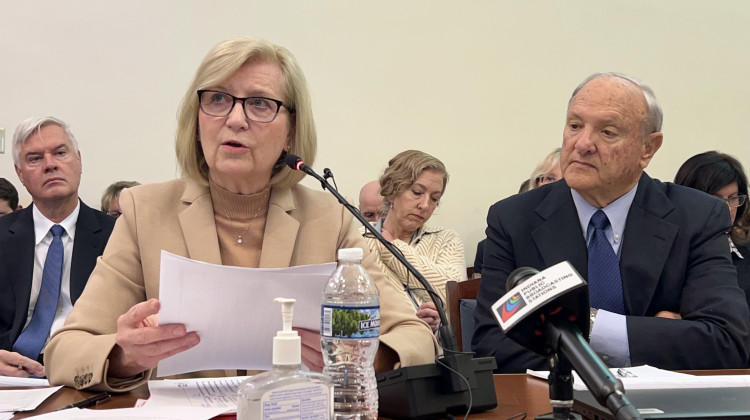
State Health Commissioner Dr. Kris Box, left, and Public Health Commission co-chair and former state Sen. Luke Kenley, right, present legislation to the Senate Health and Provider Services Committee on Wednesday, Feb. 1, 2023.
Brandon Smith/IPB NewsSenate lawmakers took their first step Wednesday aimed at dramatically improving Indiana’s public health system. But a committee hearing also revealed the challenges that lay ahead.
The legislation, SB 4, is largely compromised of recommendations from Gov. Eric Holcomb's Public Health Commission, which finished a two-year study of the state's public health system last year.
The measure contains a list of about two dozen core services local health departments must provide if they want to get significantly increased funding from the state. That includes everything from food protection and local pool inspections to immunizations and maternal and child health services.
Local government organizations, health care groups and representatives from the business community all support the bill. Knox County Commissioner Kellie Streeter said providing quality public health care affects so much more – education, public safety and economic development.
“Many site selectors ask – what is your infectious disease rate? What is your fetal, infant mortality rate? It is real," Streeter said. "They want to build in my community, but they want to know we’re healthy and we have services.”
But some county leaders, like St. Joseph County Councilor Amy Drake, fear state takeover of local public health – even if the bill and the funding tied to it are optional.
“If I tell my constituents I don’t want to take a big chunk of money, they’re going to say, ‘Why don’t you care about us? Why don’t you care about our public health?’" Drake said. "And our issue is, we don’t want to opt into that and then have so many strings that we’re not allowed to make decisions that we want for our people.”
Much of the opposition was from people peddling COVID-19 lies and misinformation. But there were more concrete, specific issues raised with the legislation.
Join the conversation and sign up for the Indiana Two-Way. Text "Indiana" to 73224. Your comments and questions in response to our weekly text help us find the answers you need on statewide issues throughout the legislative session. And follow along with our bill tracker.
One provision in the bill allows advanced practice nurses or physician assistants with a master's degree in public health to serve as a local health officer. Physicians like Dr. David Diaz from the Indiana State Medical Association balked at that language, arguing it should be limited to doctors.
Diaz acknowledged that finding physicians to fill those roles can be difficult. But he suggested other ways to do so, rather than allowing other kinds of health care providers.
"Things like access to state retirement benefits, more competitive salaries, incentive programs like loan repayment for education loans could help attract more physicians to dedicate their time," Diaz said.
Heather Harris of the Coalition For Advanced Practice Nurses took issue with that provision in the other direction. She said she understands balancing the need to find more local health officers with ensuring people serving in those roles are capable.
"But also make sure we're doing it in a way that we're not searching for unicorns, people that just don't exist in the world – [advanced practice nurses] with [master's of public health degrees]," Harris said.
The committee unanimously approved the bill, though some senators expressed hesitance and advocated for greater guardrails to ensure local control.
The funding that accompanies the legislation will be in the state budget bill.
Brandon is our Statehouse bureau chief. Contact him at bsmith@ipbs.org or follow him on Twitter at @brandonjsmith5.
9(MDAyMzk1MzA4MDE2MjY3OTY1MjM5ZDJjYQ000))
 DONATE
DONATE






 Support WFYI. We can't do it without you.
Support WFYI. We can't do it without you.